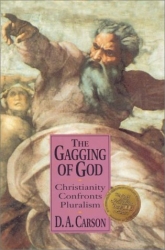A Brief Book Summary from Books At a Glance
Editor’s Note: Because of the extended length and scope of D.A. Carson’s important work, The Gagging of God, our Summary has been divided in two parts. In Part 1 we summarized chapters 1-7, which if you missed you can catch up here. Now in Part 2 we summarize chapters 8-14.
Summary
Chapter 8
On Drawing Lines, When Drawing Lines is Rude
There is nothing more offensive in a postmodern, pluralistic milieu than for people to make exclusivistic truth claims. Christianity, however, requires us to do so. Many people today consider drawing lines rude, but we must. We are finite and sinful, but God in grace allows us to have genuine knowledge. This entails that some views are right and others are wrong. The Bible is more than merely a revelation of propositions, but it is not less. This reality means that doctrinal and theological truth claims are made in Scripture and they must be upheld.
Since there is a difference between truth and error, there is also a difference between orthodoxy and heresy. Some revisionists have attempted to demonstrate that Christianity was theologically very diverse from the earliest times, and that “orthodoxy” was simply the version that won out over the other equally legitimate forms. These theses have never been sustained by the evidence. In fact, the New Testament models the way the church distinguished orthodoxy from heresy. There are simply some truths that make Christianity what it is—deny them, and Christianity is no longer Christianity.
Although this is very difficult, there are so many errors today it is essential to draw lines where the Bible does. We cannot even rest only on the creeds and theological formulations of the early church, since they were formulating theology in light of the pressures and deviations of their own times. Fresh challenges require fresh wrestling with the biblical texts. The creeds may be necessary without being sufficient. Even in the New Testament writings some letters deal with one error while another letter tackles a different error—we need to be able to respond to the challenges with which we are confronted. Standing for truth must, of course, be done with humility and Christian virtue. We must also draw lines in the moral arena. Again, this must be done with grace, but God makes absolute moral demands, requires repentance, and insists that Christians demonstrate moral change in their lives.
Chapter 9
Nibbling at the Edges: The Range of the Challenge
Many political commentators and cultural analysts of all stripes are voicing the concern that Western culture is disintegrating and societal institutions are fragmenting. This chapter explores some of the damage being done in select spheres (mainly focused on the USA but with principles that transfer to most Western nations). America in its early years was shaped by a Judeo-Christian heritage. It was assumed that there was a God and moral law. Protestantism was not the only view, but it exerted a great degree of influence. The Founding Fathers argued that democracy could only function where the people had a common moral compass and vision. If government is elected on the basis of pragmatics and there is no common moral code then it is not certain that democracy will function effectively or even survive….
[To continue reading this summary, please see below....]The remainder of this article is premium content. Become a member to continue reading.
Already have an account? Sign In
